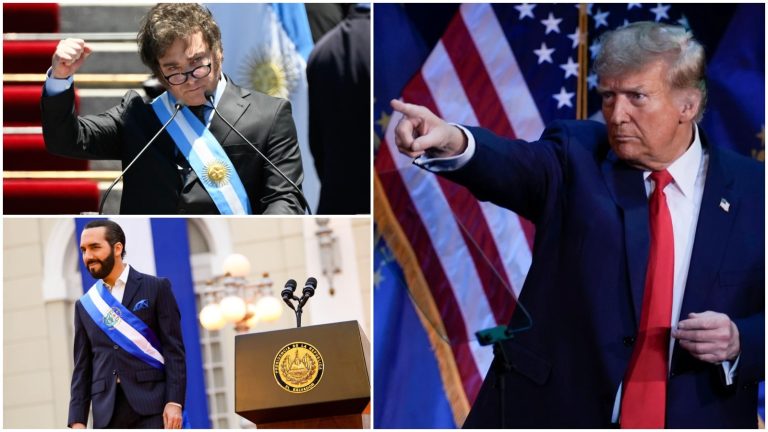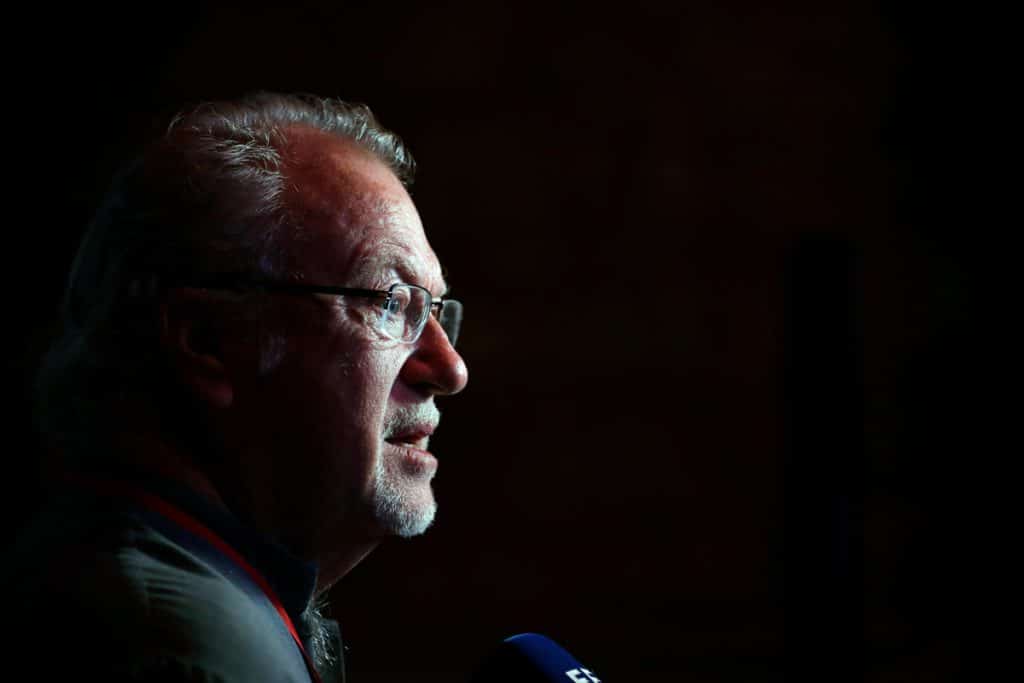29 de enero 2024

“NicaraguAmor” Cultural Caravan for Nicaraguans in the USA

PUBLICIDAD 1M
PUBLICIDAD 4D
PUBLICIDAD 5D
“It’s very worrisome that voters are seeking people like that to resolve their problems,” warns the US journalist.

Javier Milei of Argentina; Nayib Bukele of El Salvador; and Donald Trump of the United States. Photos from different press agencies / collage by Confidencial
Well-known writer and reporter Jon Lee Anderson has covered war zones in the Middle East and other areas, and written extensively on Latin America, including profiles of leaders such as Hugo Chavez, Fidel Castro, and Augusto Pinochet[SH1] . He’s also the author of the 1997 biography, Che Guevara: A Revolutionary Life. In an interview with EFE on January 24, he expressed concern for the political direction of certain countries in Latin America, and of presidents such as El Salvador’s Nayib Bukele or Argentina’s recently elected Javier Milei. Anderson feels these figures are following the path laid out by former US President Donald Trump, who is now seeking to return to power.
“There are indications that Trump populism has its clones. I believe that Bukele and Milei are clear examples of that type of authoritarianism, or at least an authoritarian method paired with a populist presentation, breaking with past protocols and the traditional national norms for how politicians act. It’s concerning, very concerning, that the electorates are seeking people like that to solve their problems,” Jon Lee Anderson told EFE in Panama.
The staff writer for The New Yorker is also the author of works in Spanish like: ‘Los años de la espiral: crónicas de América Latina (2010-2020).” He says he used the term “spiral” to refer to the Latin American region where “instability, the lack of a clear direction” predominates. This situation continues today.

Anderson’s broad analysis includes all of the Americas, but he sees the United States as one of the countries on the continent going through the greatest period of crisis, with the specter of Trump “returning to the stage.” “I don’t know if he’ll win, but it’s possible he will. US citizens in general are in a phase of ethical and moral limbo that’s very palpable.”
“The region is having problems, and the society with possibly the most problems is that of the United States. Being the great economic power it is ( ..) its problems have a very definitive replicating effect, and that’s worrisome,” he added.
According to the seasoned reporter, one of the few positive aspects in the region has been Bernardo Arevalo’s coming to power as Guatemala’s president, despite numerous attempts on the part of the Attorney General’s office to prevent it. “[This is] a recent example that offers some hope, in the face of the stonewalling of the traditional powers in Guatemala, which are very antidemocratic.”
Then there are the “down the drains” as he defined the case of Nicaragua. “What can I say about Daniel Ortega, who has become so … cruel with his people, with the Church, with the civic population? … It’s really sad and shocking.” Ortega, a Sandinista guerrilla, was one of the leaders of the armed insurrection that defeated the dictatorship of the Somoza family in 1979. He has perpetuated himself in power as president of Nicaragua since 2007.
“The cycle continues. It’s very volatile, and I’d say it’s in a moment of limbo, of uncharted direction right now,” he remarked.
Among Jon Lee Anderson’s best-known works is his biography of Ernesto “Che” Guevara, an investigative work that transformed him into one of the most authoritative voices on the Argentine guerrilla.
If [Guevara] had lived longer, could he have followed the same path as Ortega, or does he see this as impossible?
“I’d never say that anything was impossible. Che died at the age of 39, in a different era. At the time he lived and struggled, he preached the dictatorship of the proletariat. Sometimes his words were more heated than his actions. He was a guy of many talents, a sense of humor, well read, and I believe he was still evolving. I would hope that the Che I came to know through my research would be a man with the possibility of adapting and evolving, the potential to change,” Anderson explained.
In addition, he stressed: “he was already critical of the Soviet Union; he left Cuba for that reason also. He continued being a revolutionary. He made mistakes, but deep down he sought to create more just societies, in an era in which – in many cases – it really was necessary to wage an armed struggle against feudal of semi-feudal societies. (…) That period changed, today there’s no one left, in my opinion, who says or thinks that the way to change things in Latin America is with a rifle in hand.”
However, one of the major problems in Latin America currently is that it’s become “the cesspool of narco-trafficking, nearly on a world scale, and many of the societies and economies aren’t functioning. There are many aspects of several Latin American countries that are complete failures, from the rule of law to the economies. What does it mean that in capitalism, in democracy, in the 21st century, entire societies are living from the remittances sent by their relatives living illegally in the United States? That’s not a working system – it’s not working well for anyone, and that reality is radicalizing the politics in many countries.”
EFE spoke with Jon Lee Anderson in Panama, where he was participating in the first edition of the Hay Forum to take place in that country. The Forum concluded on January 24. In one of the conference sessions titled, “The challenges of investigative reporting,” Anderson underlined the importance of journalism as the “guardian of democracy,” and stressed the danger that Donald Trump represents.
“I wasn’t as clearly aware of the relationship [of journalism] to democracy until the election of Donald Trump. When he began to rant against the media and to say explicitly that the journalists, the press, the media, are enemies of the people, I understood that as members of the press, we did have great importance. I also understood that his real adversary was precisely the responsible media outlets, not the so-called Fake News,” noted Anderson.
For that reason, the journalist defines Trump as “the model for the destruction of democracy.” “His peers and his emulators in Latin America and other countries have understood very well that this same formula can bring them to power, allow them to maintain power, and do whatever they feel like doing. They’ve also understood that the impartial, honest, and independent media outlets … are the enemies of those who oppose democracy, because they are the guardians of democracy.”
“I don’t have the magic key, but journalism needs to buckle up. It has to be brave; it must face up to the autocrats and those who want to eliminate us.”
This article was published in Spanish in Confidencial and translated by Havana Times. To get the most relevant news from our English coverage delivered straight to your inbox, subscribe to The Dispatch.
PUBLICIDAD 3M
Agencia de noticias internacional con sede en Madrid, España. Fundada en Burgos durante la guerra civil española en enero de 1939.
PUBLICIDAD 3D